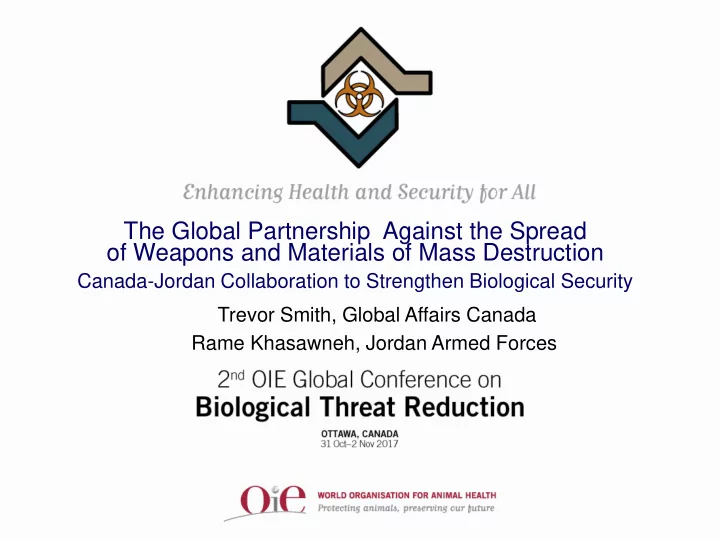

The Global Partnership Against the Spread of Weapons and Materials of Mass Destruction Canada-Jordan Collaboration to Strengthen Biological Security Trevor Smith, Global Affairs Canada Rame Khasawneh, Jordan Armed Forces
The Global Partnership Against the Spread of Weapons And Materials of Mass Destruction (GP) Began at the 2002 Kananaskis G8 Summit as a 10-year, $20 billion initiative “We commit ourselves to prevent terrorists, or those that harbor them, from acquiring or developing nuclear, chemical, radiological and biological weapons; missiles; and related materials, equipment and technology. We call on all countries to join us in adopting the set of non-proliferation principles we have announced today.” Statement by G8 Leaders in Kananaskis, June 27, 2002 • Supports and coordinate projects and activities in the areas of chemical, biological, radiological and nuclear (CBRN) security • More than $25 billion allocated worldwide to prevent CBRN terrorism • Mandate has evolved and been extended • Increased focus on biosecurity after initial focus on nuclear security and chemical weapons destruction • Chair coincides with Presidency of G7 • Current Chair: Italy 2018: Canada 2019: France 2
Global Partnership Members Australia France Kazakhstan Portugal Belgium Georgia Korea Spain Canada Germany Mexico Sweden Chile Hungary Netherlands Switzerland Czech Republic Ireland New Zealand Ukraine Denmark Italy Norway United Kingdom EU Japan Philippines United States Finland Jordan Poland Participation and implementation by key partners, including ASEAN OIE UNODA IAEA INTERPOL OPCW WHO BTWC 3
Biological Proliferation & Deliberate Threats Numerous states “weaponized” dozens of diseases Terrorist and criminal groups have previously sought, and remain focused on, acquiring biological weapons (BW) capabilities. Serious threats to Jordan from Daesh and Syria Biological agents pose unique threats to global security Naturally-occurring Self-replicating Dual-use nature No international monitoring or implementation agency for BW Highly infectious pathogenic material Only a small quantity needed for a robust biological weapons capacity One incident could cause a major disease outbreak or global pandemic Difficulties determining when/if pathogens removed from labs
GP Biosecurity “Deliverables” Strengthening Global Biological Security Secure and account for materials that represent biological proliferation threats. Develop and maintain appropriate and effective measures to prevent, prepare for and respond to the deliberate misuse of biological agents. Strengthen global networks to rapidly identify, confirm and respond to deliberate biological attacks. Reinforce and strengthen biological non-proliferation principles, practices and instruments. Reduce proliferation risks through the advancement and promotion of safe and responsible conduct in biological sciences. 5
Strengthening Biological Security in Jordan Canada’s Global Partnership Program (GPP) has committed $49M since 2013 to strengthen Jordanian capacities to detect, identify and respond to a CBRN attack or incident originating in Syria, including: Chem/ Bio PPE and CBW detection Mobile Biological Laboratory to JAF Royal Medical Services & Modular BSL-3 Laboratory for Ministry of Health CBRN training delivered by Canada’s Department of National Defence (DND), the Royal Canadian Mounted Police (RCMP) & INTERPOL Support for two Crises Management Centers (CMC) CBRN training field at JAF CSU, including biological and chemical expansion Establishment of a regional Biological Risk-Management & Genomics Training Centre at the Jordan University of Science and Technology (JUST) Medical Guidelines for managing CBRN incidents 6
Strengthening Biological Security in Jordan • VIDEO 7
Collaboration at the Health/Security Interface Strengthened public health and response for natural outbreaks = Strengthened preparedness for deliberate outbreak Enhanced biological security requires increased collaboration between the security and health sectors at the “health - security interface”, where respective interests & responsibilities coincide. Global Health Security Agenda (GHSA) Prevent 3: Biosafety & Biosecurity Detect 1: National Laboratory Systems Detect2/3: Real-Time Surveillance Respond 2: Deliberate Use
Partnering for Health & Security
Thank you Trevor Smith, Global Affairs Canada Rame Khasawneh, Jordan Armed Forces
Recommend
More recommend